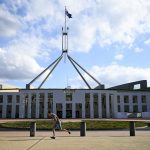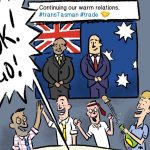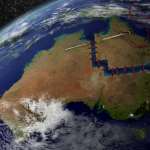Australian democracy demands a proper debate

In a speech published last week the financial services Royal Commissioner, Kenneth Hayne, argued that three Royal Commissions in quick succession – his and those currently looking into aged care and institutional child abuse – showed deep failures of politics and public policy. Royal commissions, he said, are established when policy-making gets too hard for governments.
The television pictures of Hayne refusing to shake the Treasurer’s hand as he delivered his report – refusing to be drawn into a publicity stunt requested for the cameras – provides a powerful contrasting image between hard and serious policy review and trivial entertainment as an increasingly influential aspect of the national political culture.
Setting the financial services industry’s regulatory environment is important and difficult public policy. It affects people’s livelihoods. Staged handshakes downplay the important business of government.
Perhaps this was the message in Liberal party polling this week, telling the government that the public has had enough of politics. That politicians should keep quiet for a while and get on with the job of thoughtful government.
However, effective government requires an engaged and informed public. It requires serious public debate where people are expected to have well thought out reasons for believing whatever they believe, and a willingness to defend those reasons, listen seriously to the reasons of others and, sometimes, re-think their own views.
Yet, presidential style election campaigns grounded in slogans – ‘the top end of town’, ‘have a go, get a go’ – and Tony Abbott’s election winning ‘stop the boats’ in 2013 show that reason is not how politics works.
The tension between Australia and small states like Tuvalu at the Pacific Islands Forum, over the weekend, showed the Prime Minister unable to make connections across complex areas of public policy. It exposed inconsistent foreign policy as the issue much bigger than Scott Morrison’s defence of the Australian coal industry, the 38,000 jobs it provides and the export earnings of $60.3 billion it generated in 2017-2018.
Supporting the coal industry was decisive in the Liberal National Party’s success in North Queensland seats at the federal election in May.
Morrison wasn’t going to agree to the smaller nations’ insistence that the Forum commit ‘to rapidly reduce greenhouse gas emissions’ and ‘rapidly phase out their use of coal in the power sector’.
Yet, for Australia, its aspirations for influence in the Pacific mean that the debate shouldn’t be quite as simple as it appeared to the Prime Minister of Tuvalu, Enele Sopoaga, when he said to Morrison: ‘You are concerned about saving your economy in Australia … I am concerned about saving my people in Tuvalu’.
Saving one’s country from rising sea levels is an aspiration that’s not overridden by the promise to come fruit picking in Australia as the deputy Prime Minister Michael McCormack put it. But such is the depth of analysis that informs some people’s opinions.
The Fijian Prime Minister Frank Bainimarama summed up the wider policy significance for Australia; a point that should have been well thought through as part of a coherent and consistent foreign policy. ‘China never insults the Pacific’.
Australia is concerned about China’s growing influence in the Pacific and the increasingly close Sino-Fijian relationship.
Its step-up in engagement Pacific policy, introduced in 2017, is intended to counter growing Chinese influence. But that requires a standing in the region that Morrison no longer enjoys.
In 2018, the Morrison Government announced $3 billion in support for infrastructural development projects in the Pacific and committed to military training in the region. A further $500 million for renewable energy and disaster relief projects was committed just before the Forum meeting.
The Opposition generally supported this policy direction. Both parties agreed that in spite of the Fijian Military Force’s long-standing contribution to domestic political instability, they would strengthen military cooperation. They would court a potential ally.
For Australia, the debate in Tuvalu, should have been understood in that wider context. In the context of where Australia stands in relation to China’s ambitions in the Pacific and beyond.
This is a debate that, worryingly for Australian democracy, the country is avoiding. Perhaps it is just too hard to think dispassionately about the economy that buys 30% of one’s exports.
But there is a serious crisis of leadership when, in the context of Australian foreign policy and in the context of protests in favour of democracy in Hong Kong, comments about Chinese ambitions from Andrew Hastie, chair of the Parliamentary Joint Committee on Intelligence and Security, are played down by members of the government and dismissed as ‘reckless’ by the Leader of the Opposition.
Hastie argued that the West’s failure to think about China’s aspirations, as China itself thinks about them, is akin to Europe’s failure to foresee the rise of Nazi Germany. The comparison was inflammatory but the real point, that Australia’s approach to China requires more careful thought is clear.
Trying to close down debate reflects the same kind of weakness in democracy that Hayne identified in respect of financial services, the care of children in institutions and people in aged care facilities.
Australian democracy is failing to deal with the complex interrelationships among coal, climate change, regional security interests and between human rights and trade.
Public policy is hard. But, as Kenneth Hayne explained, and as the weekend’s events in Tuvalu reinforce, Australia’s contemporary political culture of slogans and disengagement from proper debate and scrutiny makes it harder still.

Dominic O’Sullivan is Professor of Political Science at Charles Sturt University and Adjunct Professor in the Centre for Maori Health Research at the University of Auckland University of Technology. His recent publications include ‘We Are All Here to Stay’: citizenship, sovereignty and the UN Declaration on the Rights of Indigenous Peoples and Sharing the Sovereign: Recognition, Treaties and the State.














